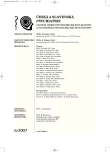-
Medical journals
- Career
Repetitive Transcranial Magnetic Stimulation (rTMS), Depressive Disorder and Cognitive Functions (A Review)
Authors: H. Kučerová; R. Přikryl; M. Krejčířová
Authors‘ workplace: Psychiatrická klinika LF MU a FN Brno přednostka prof. MUDr. E. Češková, CSc.
Published in: Čes. a slov. Psychiat., 103, 2007, No. 6, pp. 285-290.
Category: Comprehensive Reports
Overview
Depression is associated with a certain kind of cognitive deficit. Cognitive deficit in depression is characterized especially by impaired memory, impaired attention, executive functions deficit and diminished verbal fluency.
Repetitive transcranial magnetic stimulation (rTMS) is a noninvasive brain technique and turns out as a pottentionally suitable tool for treatment of depression in all sorts of this disorder. In spite of that is necessary to improve our knowledge about optimal parametres of rTMS application and its time frame for maintenance of treatment.
On the top of this, continuation of rTMS effect and safeness of sequel therapy are not explored very well. This study pointed to that comprehensive review of reasonable professional literature, which shows that rTMS is a safe method for treatment of depression, but possibilities in use rTMS in influencing of some characteristics of cognitive functionar is still not very well known and it is important to execute more research work.Key words:
depression, cognitive function, neuropsychology, repetitive transcranial magnetic stimulation (rTMS).
Labels
Addictology Paediatric psychiatry Psychiatry
Article was published inCzech and Slovak Psychiatry

2007 Issue 6-
All articles in this issue
- A Psychosocial Need Inquiry in Young Acute Psychotic Patients (A Pilot Study)
- Pharmacotherapy of Anorexia Nervosa
- Repetitive Transcranial Magnetic Stimulation (rTMS), Depressive Disorder and Cognitive Functions (A Review)
- Night Eating Syndrome
- Central Pontine Myelinolysis in Female Patient with Anorexia Nervosa
- Czech and Slovak Psychiatry
- Journal archive
- Current issue
- Online only
- About the journal
Most read in this issue- Central Pontine Myelinolysis in Female Patient with Anorexia Nervosa
- Repetitive Transcranial Magnetic Stimulation (rTMS), Depressive Disorder and Cognitive Functions (A Review)
- Night Eating Syndrome
- Pharmacotherapy of Anorexia Nervosa
Login#ADS_BOTTOM_SCRIPTS#Forgotten passwordEnter the email address that you registered with. We will send you instructions on how to set a new password.
- Career

